Develop Add-ons like a pro
Everything* about
add-on development
workflow
* Not necessarily valid for every meaning of the word "Everything"
Ph.D. on crowd simulation
& developer
Employed by the Blender Institute since March 2016
Blender commit rights since 2014
First bug report in 2004
Two things
Interrupt me
&
Ask stupid questions
Outline
- Work environment & project structure
- Best behaviour
- Common pitfalls
Work Environment
Development environments
- Blender Text Editor
- PyCharm & PyDev
- Atom & Sublime
- VIM & Emacs
My desktop
- Kubuntu Linux 16.04
- Shell: ZSH
- Atom, PyCharm (Community edition), Qt Creator
- Blender Text Editor
Code completion & Highlighting
Or: how do I get rid of all those red squigglies?
Rebuild Blender as module
In CMakeCache.txt set WITH_PYTHON_MODULE:BOOL=ON
make && make install
Virtualenv & Virtualenvwrapper
Install them, well documented how
mkvirtualenv -p /usr/bin/python3.5 bladdons
cdvirtualenv
cd lib/python3.5/site-packages
ln -s ~/workspace/blender-git/build_bpy/bin/bpy.so
ln -s ~/workspace/blender-git/blender/release
Virtualenv & Virtualenvwrapper
% python
Python 3.5.2 (default, Sep 10 2016, 08:21:44)
[GCC 5.4.0 20160609] on linux
Type "help", "copyright", "credits" or "license" for more information.
>>> import bpy
>>> bpy.ops.wm.quit_blender()
Blender quit
Project structure
Can be a single Python file
Better: proper Python project
- README.md
- setup.py
- package_name / __init__.py
- / submodule.py
- tests/test_xxx.py
- setup.cfg
Show of hands
Who uses version control software?
Where are my files?
Where you want them to be
Making Blender find them
- Linux, BSDs, etc.:
- Symlink package into ~/.config/blender/2.78/scripts/addons
- Windows:
- Configure Blender to load scripts from C:\workspace\my_addons
- MacOS:
- No idea, probably either of the above options work
Getting started
Blender Text Editor has many examples
import bpy
def main(context):
for ob in context.scene.objects:
print(ob)
class SimpleOperator(bpy.types.Operator):
"""Tooltip"""
bl_idname = "object.simple_operator"
bl_label = "Simple Object Operator"
@classmethod
def poll(cls, context):
return context.active_object is not None
def execute(self, context):
main(context)
return {'FINISHED'}
def register():
bpy.utils.register_class(SimpleOperator)
def unregister():
bpy.utils.unregister_class(SimpleOperator)
Turning your package into an add-on
bl_info = {
'name': 'Blender Cloud',
'author': 'Sybren A. Stüvel, Francesco Siddi, Inês Almeida, Antony Riakiotakis',
'version': (1, 4, 99),
'blender': (2, 77, 0),
'location': 'Addon Preferences panel, and Ctrl+Shift+Alt+A anywhere for texture browser',
'description': 'Texture library browser and Blender Sync. Requires the Blender ID addon '
'and Blender 2.77a or newer.',
'wiki_url': 'http://wiki.blender.org/index.php/Extensions:2.6/Py/'
'Scripts/System/BlenderCloud',
'category': 'System',
'warning': 'This is a beta version; the first to support Attract.'
}
Parsed, not executed
Best Behaviour
Naming your classes
Naming your classes
- Operator
bpy.ops.bcloud.browse class BCLOUD_OT_browse- Panel
bl_idname='mesh.scramble' - class MESH_PT_scramble
... and similar for menus, headers, etc.
Reloading with F8
What does F8 do?
- Call
unregister() - Reload Blender-loaded modules from disk
- Execute those modules' code
- Call
register()
Code on disk != module in memory
# Your code
x = 5
# Your new code
x = 8
Making your code reloadable with F8
if "bpy" in locals():
import importlib
importlib.reload(Boltfactory)
else:
from add_mesh_BoltFactory import Boltfactory
import bpy
...
What's happening?
self.report()print()statements- remote debugging
loggingmodule
print() statements
- +
- Simple to use, well-known
- -
- Must be removed to hide output
- No metadata (timestamps, severity level, location in code)
- No user control
Remote debugging
- +
- Detailed info of code flow & state
- Does not require extra code
- (depending on IDE) Smart breakpoints
- -
- Little metadata (timestamps, severity level)
- Requires IDE support & configuration
- Only for developers
Remote debugging with PyDev
sudo apt-get install eclipse-pydev- Just download & instal from https://eclipse.org/downloads/
- Follow PyDev installation manual http://www.pydev.org/manual_101_install.html
- Install my remote debugging add-on from Github
- Configure it for
/home/sybren/.p2/pool/plugins/org.python.pydev_5.3.0.201610121612/pysrc/pydevd.py
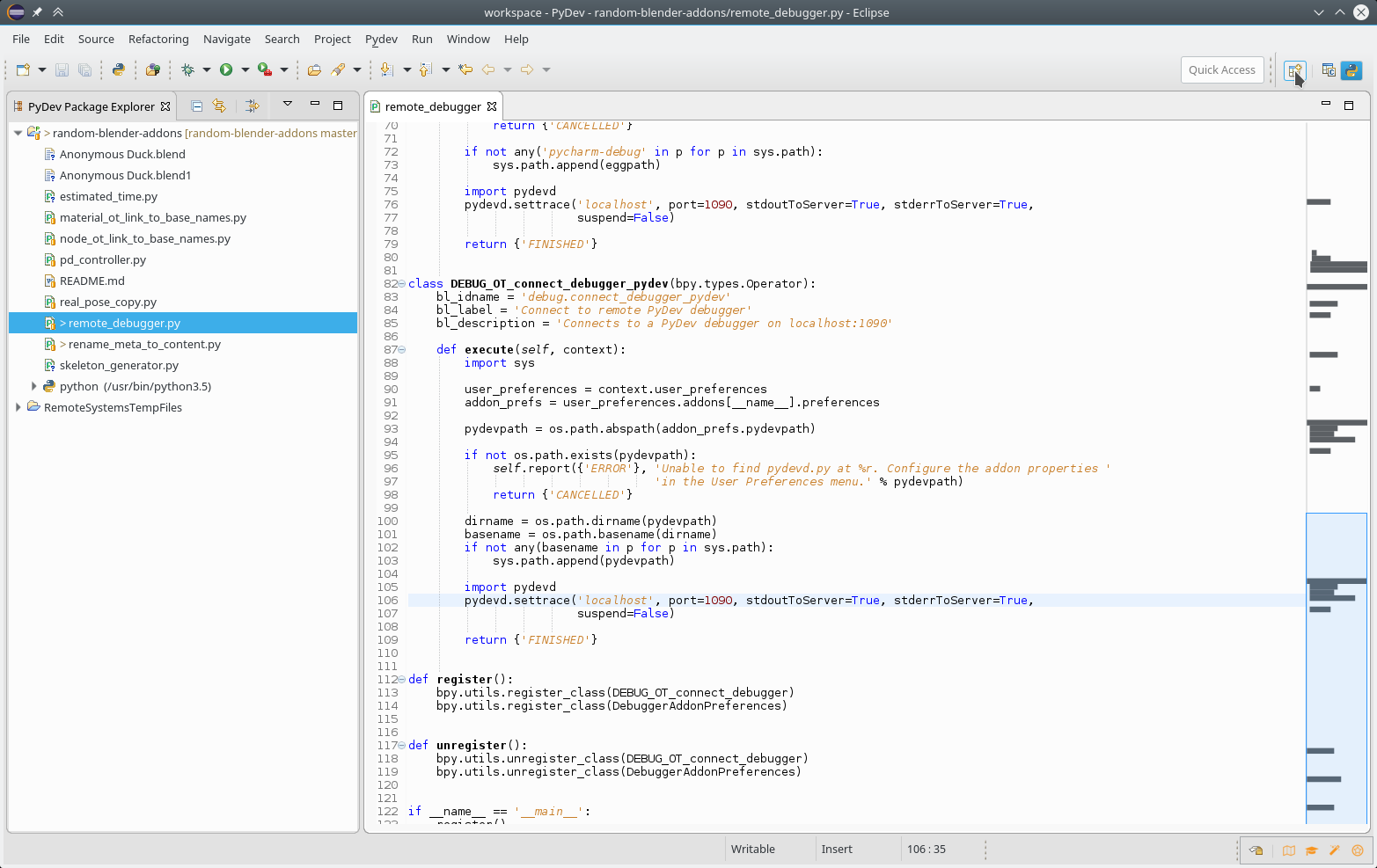
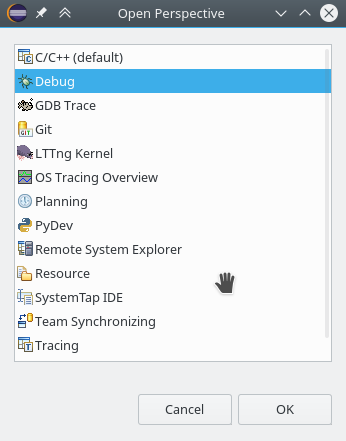
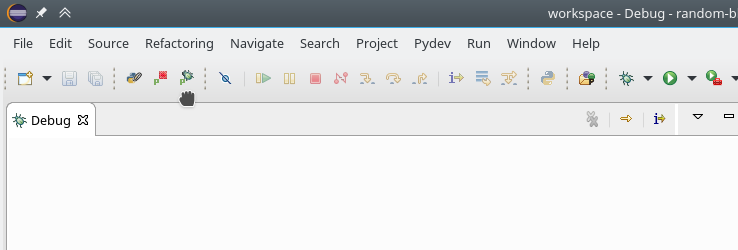
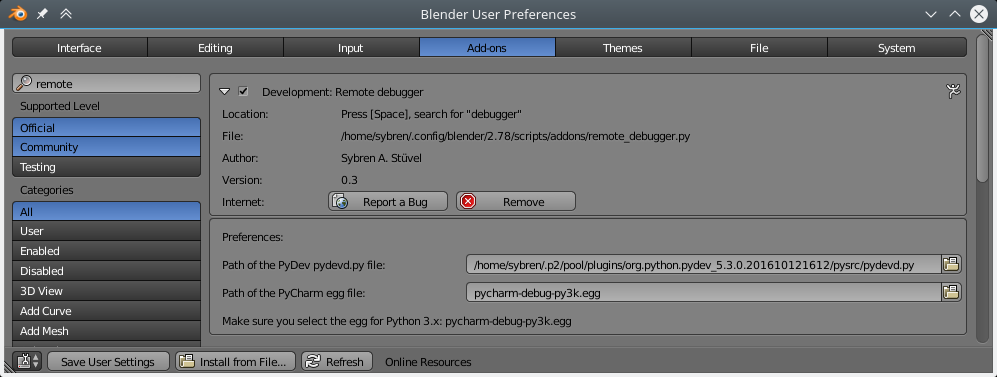
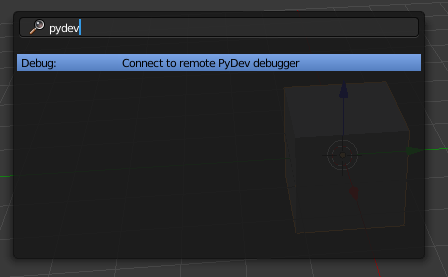
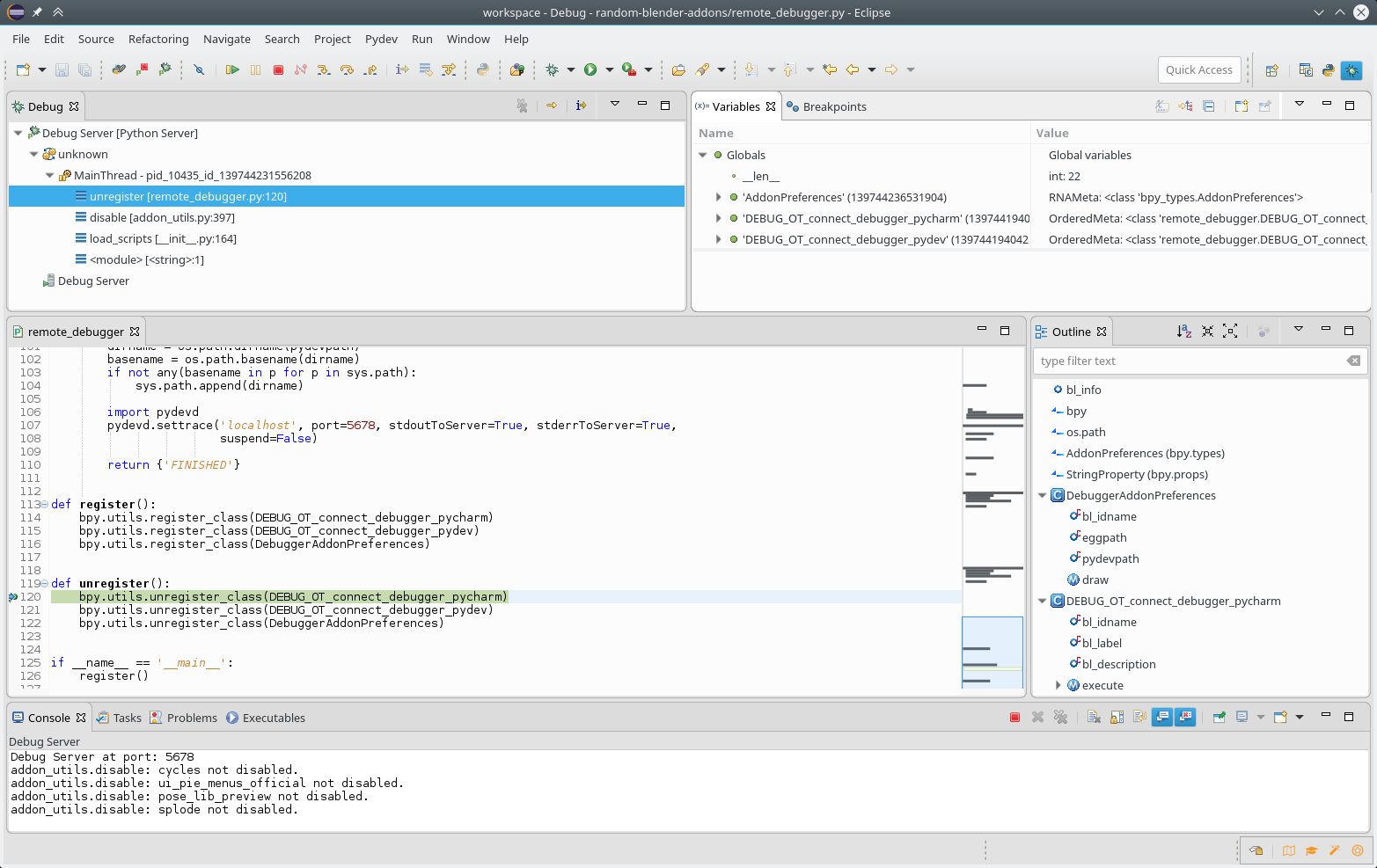

Logging module
- +
- Can be left in the code
- Metadata available (timestamps, severity level, location in code)
- Detailed user control
- -
- Slightly more complex than
print() - Requires some configuration for optimal use
Logging module example
class SimpleOperator(bpy.types.Operator):
bl_idname = "object.simple_operator"
bl_label = "Simple Object Operator"
log = logging.getLogger('bpy.ops.%s' % bl_idname)
def execute(self, context):
self.log.info('It is happening now in scene %s', context.scene)
if not context.object:
self.log.warning('No active object, not doing anything')
self.log.debug('Not doing anything here either')
return {'FINISHED'}
Default behaviour
Shown on stdout, only WARNING or higher level.
No active object, not doing anything
Configured as I like it
Still shown on stdout, INFO or higher level.
DEBUG level for selected loggers.
Metadata shown partially.
16:00:03.03 bpy.ops.object.simple_operator WARNING No active object, not doing anything
16:00:03.13 bpy.ops.object.simple_operator DEBUG Not doing anything here either
Configuration
Loaded at Blender startup.
.../scripts/startup/config_logging.py
- Linux
~/.config/blender/2.78/...- Windows
%APPDATA%\Blender Foundation\Blender\2.78\...- MacOS
/Users/$USER/Library/Application Support/Blender/2.78/...
import logging.config
logging.config.dictConfig({
'version': 1,
'formatters': {'default': {'format': '%(asctime)-15s %(levelname)8s %(name)s %(message)s'}},
'handlers': {
'console': {
'class': 'logging.StreamHandler',
'formatter': 'default',
'stream': 'ext://sys.stderr',
}
},
'loggers': {
'bpy.ops.': {'level': 'DEBUG'},
'blenderid': {'level': 'DEBUG'},
'bid_api': {'level': 'DEBUG'},
'bid_addon_support': {'level': 'DEBUG'},
},
'root': {
'level': 'WARNING',
'handlers': ['console'],
}
})
Common pitfalls
Comments
Document why
The what & how should be clear from code.
Docstring can describe the what, and is the first thing to write.
EnumProperty items callbacks
Warning: There is a known bug with using a callback, Python must keep a reference to the strings returned or Blender will misbehave or even crash.
EnumProperty items callbacks (SEE NEXT SLIDE)
def pyside_cache(wrapped):
"""Stores the result of the callable in Python-managed memory.
This is to work around the warning at
https://www.blender.org/api/blender_python_api_master/bpy.props.html#bpy.props.EnumProperty
"""
import functools
@functools.wraps(wrapped)
# We can't use (*args, **kwargs), because EnumProperty explicitly checks
# for the number of fixed positional arguments.
def wrapper(self, context):
result = None
try:
result = wrapped(self, context)
return result
finally:
wrapped._cached_result = result
return wrapper
EnumProperty items callbacks revised version
This stores the cached results in the bl_rna dict for the property, rather
than on the callback function. A downside is that the decorator now needs the name of
the property it's a callback for.
def pyside_cache(propname):
if callable(propname):
raise TypeError('Usage: pyside_cache("property_name")')
def decorator(wrapped):
"""Stores the result of the callable in Python-managed memory.
This is to work around the warning at
https://www.blender.org/api/blender_python_api_master/bpy.props.html#bpy.props.EnumProperty
"""
import functools
@functools.wraps(wrapped)
# We can't use (*args, **kwargs), because EnumProperty explicitly checks
# for the number of fixed positional arguments.
def wrapper(self, context):
result = None
try:
result = wrapped(self, context)
return result
finally:
rna_type, rna_info = getattr(self.bl_rna, propname)
rna_info['_cached_result'] = result
return wrapper
return decorator
"A function should have only one point of return"
BUT WHY!?
Return early
... and use break, continue etc.
common approach: If good → do it
dr. Sybren says: If bad → abort
NEE
def some_func(param1: int, param2: float) -> float:
"""Performs our special snowflake multiplication.
:param param1: non-zero integer
:param param2: positive float
:returns: our magic number
"""
if param1 != 0:
if param2 > 0:
return param1 * param2
else:
raise ValueError('param2 must be positive')
else:
raise ValueError('param1 may not be zero')
Oooooh JA!
def some_func(param1: int, param2: float) -> float:
"""Performs our special snowflake multiplication.
:param param1: non-zero integer
:param param2: positive float
:returns: our magic number
"""
if param1 == 0:
raise ValueError('param1 may not be zero')
if param2 <= 0:
raise ValueError('param2 must be positive')
return param1 * param2
NOOOO
def somefunc(...):
...
if jemoeder.weight > 3:
return True
else:
return False
Yes!
def somefunc(...):
...
return jemoeder.weight > 3
Must read!
The little book of Python anti-patterns
Putting
1 GB of assets
in your add-on
Instead of putting 1 GB of assets in your add-on...
bpy.utils.user_resource('CACHE') (once T47684 is done)
https://github.com/ActiveState/appdirs/blob/master/appdirs.py
Just one more thing
x += y
is not the same as
x = x + y
We looked at
- Setting up a work environment
- Creating an add-on & naming classes
- F8 to reload
- Using logging
- Returning early & often
- … and other silly things